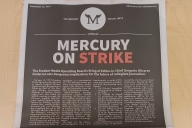You have /5 articles left.
Sign up for a free account or log in.
I had many strong reactions to Louis J. Freeh's finding that Penn State officials had been active in covering up Jerry Sandusky's ongoing abuse of young boys. Unfortunately, surprise was not one of them.
The topic has been covered by so many more knowledgeable writers that there is not much left to say. However, one series of incidents, as described in the New York Times article covering the report, does seem worthy of comment beyond "what a depressing disgrace":
"In 2000, a janitor at the football building saw Mr. Sandusky assaulting a boy in the showers. Horrified, he consulted with his colleagues, but decided not to do anything. They were all, Mr. Freeh said, afraid to “take on the football program.”
“They said the university would circle around it,” Mr. Freeh said of the employees. “It was like going against the president of the United States. If that’s the culture on the bottom, then God help the culture at the top.”
I understand that football is a major source of revenue for large universities, and that there is a certain amount of pressure to maintain a positive, winning image to keep the money flowing.
But I have been imagining what such institutions of higher education might be like without the pressure to bring in the big bucks. And what I have come up with is a version of the college I actually attended back in the early 1970s.
As described here before, we had been an all-women's college until the year I matriculated; during the four years I was there, the male population swelled to about 15. So there was no football program. We had some fine athletes, but sports programs simply were not a financial priority.
We were part of the state system, so our funding came from a combination of tuition and government support, and neither was particularly lavish. We were in the shadow of our more prestigious "brother" school, and most of the money for "sexy" programs and equipment went there. We could audit if we liked, but it was a long trip for no credit.
Yet, as in the bigger, sports-oriented schools, those of us who wanted to learn, learned. Those who wanted to party or mark time before marriage either dropped out, failed out, or found a way to get by with a minimum of work. We weren't flashy, but we were solid, and many of us went on to become academics, professionals, and public servants.
This is not to say that the environment was ideal; far from it. There was rampant sexual harassment of female students by male professors; we lived with the constant threat of rape; and we were considered "less than" the students at our bigger, flashier brother school.
All of these issues needed to be addressed, but none of them would have been resolved by a powerful football franchise. And not even the ability to provide an affordable first rate education — even if college sports were, indeed, the only way to accomplish this — is worth wrecking a child's life for.





